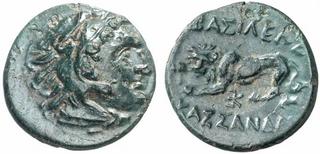Related Research Articles

Year 323 BC was a year of the pre-Julian Roman calendar. At the time, it was known as the Year of the Consulship of Longus and Cerretanus. The denomination 323 BC for this year has been used since the early medieval period, when the Anno Domini calendar era became the prevalent method in Europe for naming years.
This article concerns the period 329 BC – 320 BC.
This article concerns the period 319 BC – 310 BC.
This article concerns the period 309 BC – 300 BC.
During the 290s BC, Hellenistic civilization begins its emergence throughout the successor states of the former Argead Macedonian Empire of Alexander the Great, resulting in the diffusion of Greek culture throughout the Levant and advances in science, mathematics, philosophy, etc. Meanwhile, the Roman Republic is embroiled in war against the Samnites, the Mauryan Empire continues to thrive in Ancient India, and the Kingdom of Qin in Ancient China, the one which in the future will conquer its adversaries and unite China, begins to emerge as a significant power during the Warring States period.
Year 321 BC was a year of the pre-Julian Roman calendar. At the time, it was known as the Year of the Consulship of Calvinus and Caudinus. The denomination 321 BC for this year has been used since the early medieval period, when the Anno Domini calendar era became the prevalent method in Europe for naming years.
Year 319 BC was a year of the pre-Julian Roman calendar. At the time, it was known as the Year of the Consulship of Cursor and Cerretanus. The denomination 319 BC for this year has been used since the early medieval period, when the Anno Domini calendar era became the prevalent method in Europe for naming years.
Year 317 BC was a year of the pre-Julian Roman calendar. At the time, it was known as the Year of the Consulship of Brutus and Barbula. The denomination 317 BC for this year has been used since the early medieval period, when the Anno Domini calendar era became the prevalent method in Europe for naming years.
Year 311 BC was a year of the pre-Julian Roman calendar. At the time, it was known as the Year of the Consulship of Brutus and Barbula. The denomination 311 BC for this year has been used since the early medieval period, when the Anno Domini calendar era became the prevalent method in Europe for naming years.
Year 309 BC was a year of the pre-Julian Roman calendar. At the time, it was known as the Year of the Dictatorship of Cursor. The denomination 309 BC for this year has been used since the early medieval period, when the Anno Domini calendar era became the prevalent method in Europe for naming years.

Seleucus I Nicator was a Greek general and one of the Diadochi, the rival generals, relatives, and friends of Alexander the Great who fought for control over his empire after his death. Having previously served as an infantry general under Alexander the Great, he eventually assumed the title of basileus and established the Seleucid Empire over the bulk of the territory which Alexander had conquered in Asia.

Antigonus I Monophthalmus, son of Philip from Elimeia, was a Macedonian nobleman, general, satrap, and king. During the first half of his life he served under Philip II; after Philip's death in 336 BC, he served Philip's son Alexander. He was a major figure in the Wars of the Diadochi after Alexander's death, declaring himself king in 306 BC and establishing the Antigonid dynasty.

Cassander was king of the ancient kingdom of Macedon from 305 BC until 297 BC, and de facto ruler of southern Greece from 317 BC until his death.

Alexander IV, erroneously called sometimes in modern times Aegus, was the son of Alexander the Great and Princess Roxana of Bactria.

Antipater was a Macedonian general and statesman under kings Philip II of Macedon and Alexander the Great, and father of King Cassander. In 320 BC, he became regent of all of Alexander the Great's Empire but died the next year; he had named an officer named Polyperchon as his successor instead of his son Cassander, and a two-year-long power struggle ensued.

The Diadochi were the rival generals, families, and friends of Alexander the Great who fought for control over his empire after his death in 323 BCE. The Wars of the Diadochi mark the beginning of the Hellenistic period from the Mediterranean Sea to the Indus River Valley.

The Wars of the Diadochi, or Wars of Alexander's Successors, were a series of conflicts fought between Alexander the Great's generals over the rule of his vast empire after his death. They occurred between 322 and 281 BC.
Polyperchon (Greek: Πολυπέρχων; b. between 390-380 BC – d. after 304 BC, possibly into 3rd century BC, was a Macedonian general who served both Philip II and Alexander the Great and then played an active role in the ensuing battles for control between Alexander's generals.
The Second War of the Diadochi was the conflict between the coalition of Polyperchon, Olympias and Eumenes and the coalition of Cassander, Antigonus, Ptolemy and Lysimachus following the death of Cassander's father, Antipater.

The kingdom of Macedonia was an ancient state in what is now the Macedonian region of northern Greece, founded in the mid-7th century BC during the period of Archaic Greece and lasting until the mid-2nd century BC. Led first by the Argead dynasty of kings, Macedonia became a vassal state of the Achaemenid Empire of ancient Persia during the reigns of Amyntas I of Macedon and his son Alexander I of Macedon. The period of Achaemenid Macedonia came to an end in roughly 479 BC with the ultimate Greek victory against the second Persian invasion of Greece led by Xerxes I and the withdrawal of Persian forces from the European mainland.